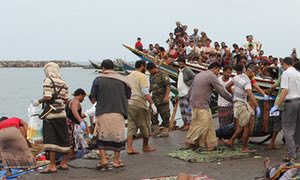
Three rockets that fell in the darkness nearby were the first sign of trouble for 150 Somali migrants packed into a boat off Yemen’s coast earlier this month.
Moments later, bullets tore into the vessel near the Red Sea port of Hodeidah, killing more than a dozen men on the upper deck, four survivors told Reuters. It was the beginning of a half-hour attack on March 16 that killed 43 civilians.
A coalition led by Saudi Arabia that is fighting the Iran-allied Houthi militia in the Arabian Peninsula country has denied carrying out the attack.
But eyewitnesses say the assault came from a warship and a helicopter and implicates the coalition, which is the only party to the conflict operating helicopters.
Reuters was unable to independently confirm these accounts.
“We heard the sound of the Apache (helicopter) coming towards us. It was maybe 40 or 50 metres above us,” said 20-year-old survivor Ibrahim Hussein. “The gunfire did not come from one direction. It fanned back and forth. Each time, it hit many people…People were shot in their abdomen, head, feet.”
The United Nations, the International Committee of the Red Cross and Human Rights Watch have collected similar testimonies.
“According to survivors’ accounts, the vessel carrying the refugees across the Red Sea was hit by shelling from a coalition warship, without any warning, followed by shooting from an Apache helicopter overhead,” U.N. High Commissioner for Human Rights Zeid Ra’ad al-Hussein said last week.
The coalition, which receives U.S. arms and logistical support, has denied responsibility.
“There was no firing by any coalition forces on Friday in the area in which the attack is alleged to have taken place,” General Ahmed al-Asseri told Reuters days later, accusing the Houthis of smuggling weapons and launching attacks via the port.
A Pentagon spokesman said no U.S. aircraft were conducting operations at the time.
In interviews last week, survivors in Houthi-controlled Hodeidah said a helicopter had circled above the boat in daytime before the attack.
Around nine o’clock at night, rockets fired from another vessel missed the migrants’ boat before heavy machinegun fire erupted.
The shots sent some overboard while others fell inside the boat, where remaining passengers took cover under their mutilated bodies, according to survivors.
Asma Birei, 22, said by telephone from a U.N. facility in Hodeidah that she had seen four women whose heads were blown off and another whose foetus was torn from her womb by the shooting.
Two other survivors interviewed at a prison where the Houthis are holding them for security checks said the helicopter had made multiple loops, opening fire repeatedly despite the migrants’ attempts to identify themselves by shouting and waving flashlights.
Birei and another woman, partly shielded on the boat’s lower deck, saw the helicopter in the afternoon but could not confirm the source of gunfire at night.
One boy jumped overboard to escape the bullets but was shot dead in the water, she said. After that, the other passengers remained motionless for two hours until the captain guided the boat to Hodeidah, the nearest port.
A dozen wounded migrants were taken to hospital as fishing boats searched for the missing. Corpses so overwhelmed the morgue that some were kept in a freezer at the fish market.
Survivors said the migrant group had been heading to Sudan for transit through Egypt or Libya en route to Europe.
Somalis, whose country has been mired in lawlessness and violence since the early 1990s, have migrated to Yemen for years, integrating into local communities and learning Arabic.
But the two-year-old conflict in Yemen has killed more than 10,000 people, left millions hungry and pushed an impoverished economy towards collapse, frightening Somalis into seeking safety further abroad.
“We could not wait any more,” said 18-year-old Raissa Osman, who survived with her aunt and cousins.
The war in Yemen has made land crossings to Gulf countries too dangerous, so the migrants took a sea route past Hodeidah, which Yemeni forces backed by the coalition are trying to isolate from other areas held by the Houthis.
That has raised fears among humanitarian agencies that aid imports, already heavily restricted, will soon be cut completely.
Copyright Ships & Ports Ltd. Permission to use quotations from this article is granted subject to appropriate credit given to www.shipsandports.com.ng as the source.